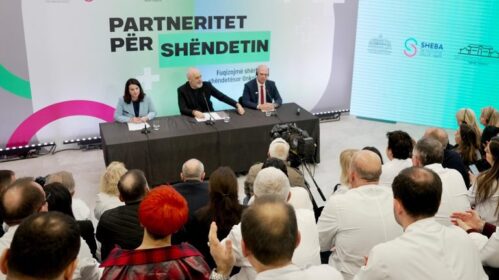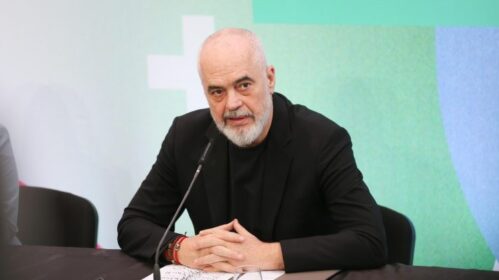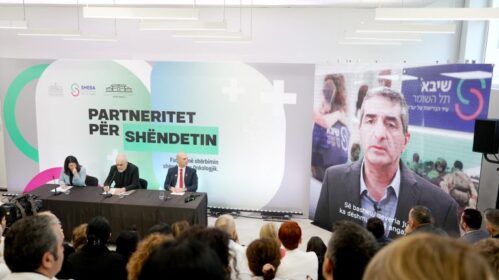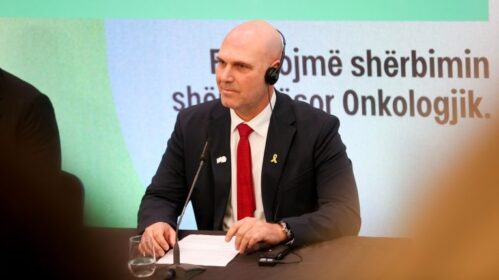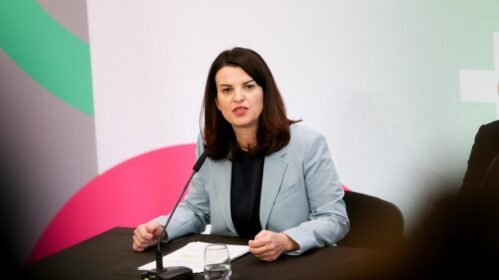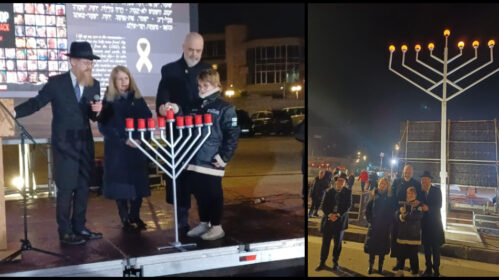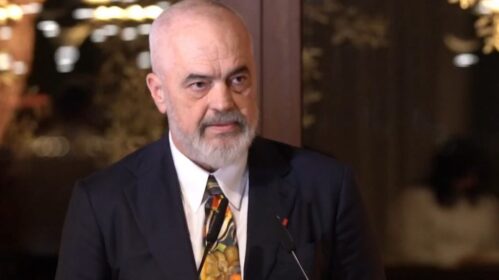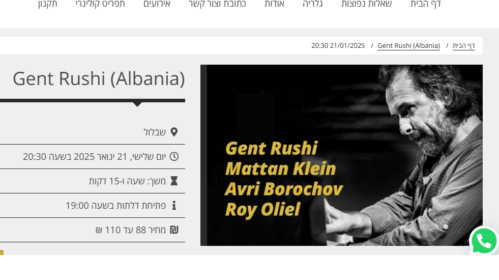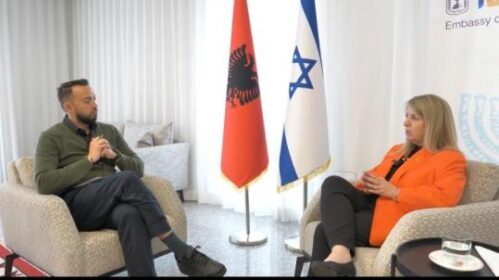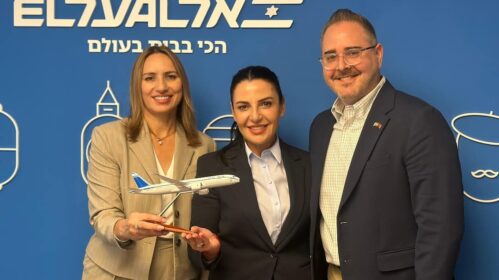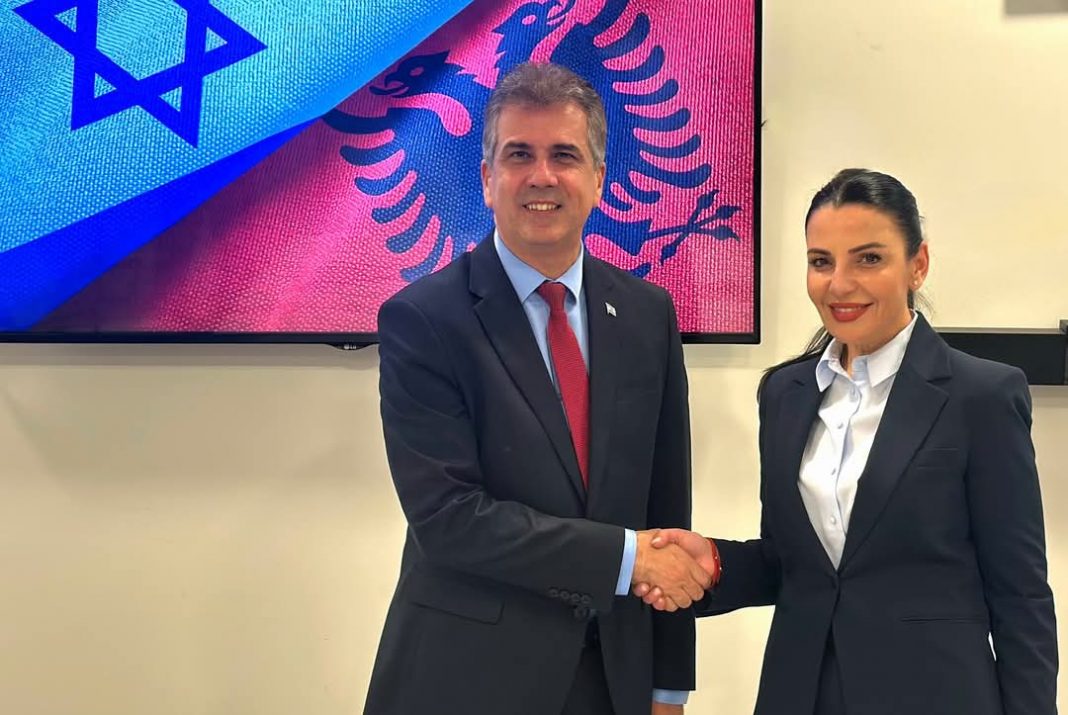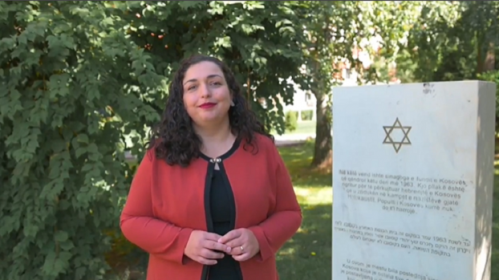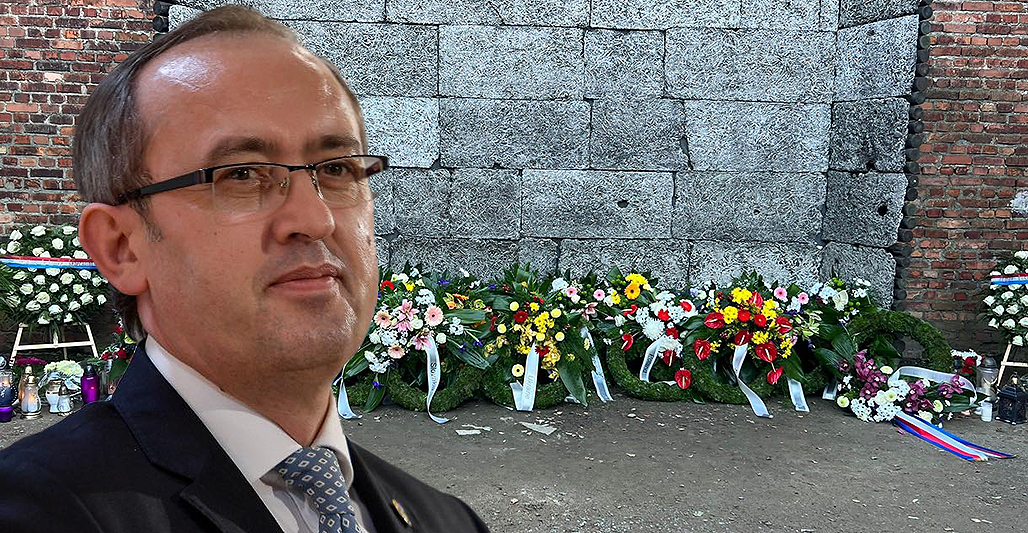SOUTHBURY – There are no foreigners in Albania, there are only guests.
The words of Drita Veseli, a member of a family of Albanian Muslims who sheltered Jews during World War II, express the spirit of Besa, an unconditional hospitality unmatched in the world.
Albanian Muslims from Waterbury’s Albanian-American community were guests of honor last week at Yom HaShoah, a Holocaust Remembrance program sponsored by the Federation, Jewish Communities of Western Connecticut.
The Holocaust: Stories of Rescue was the theme of the annual commemoration, Monday evening, April 28, at the Walzer Family Jewish Community Campus on Main Street North.
In opening remarks before some 300 people, Dr. Daniel Goodman, interim president of The Federation, noted that this year, those gathered would not only mourn the loss of six million Jews at the hands of the Nazis during World War II, but honor the compassion of men and women of other faiths who saved Jewish families by sheltering them in their own homes and in doing so, risked their own lives.
Reminding those present that two out of every three Jews in Europe were murdered in the Holocaust, Rabbi Eric Polokoff of B’nai Israel also spoke of ”acts of courage, kindness and commitment” that marked those years, particularly among the Muslims of Albania.
”Here is a narrative that must be told,” he said, ”especially today,” for it confounds prejudice at a time when Muslims themselves are frequently the targets of bigotry.
Told from the perspective of both the rescuer and the rescued, Monday evening’s program relayed story after story of Jews being hidden from the Gestapo by Muslim Albanian families.
At the start of the war, the Jewish population of Albania numbered about 200. As persecution increased, Jews from other European countries sought refuge in Albania. By war’s end, there were some 2,000 Jews living there, making it the only nation in Europe where the Jewish population increased during those years.
That phenomenon was largely due to the concept of Besa, a code of honor that guides Albanians. Besa means to keep the promise, to keep one’s word and includes a moral imperative to offer one’s home to protect and shelter any guest in need.
”Albania’s legacy of Besa is a legacy of enlightenment,” said Rabbi Polokoff, ”a legacy of civility. As Darfurians continue to face genocide, let us turn to their example. Let us speak out.”
Following the recitation of the Kaddish, the Jewish prayer of mourning, violinists Brianna and Gabrielle Fischler played somber Hebrew melodies as Rabbi Polokoff invited Holocaust survivors to come forward to light memorial candles.
Children of survivors came forward next, then grandchildren, rescuers and liberators, followed by representatives of the Albanian-American community and various Jewish organizations.
Imam Qemal Lami of the Albanian American Moslem Community explained that ”in Albania, Orthodox Christians, Muslims and Jews are like one family.”
He then relayed the story of a German-born Jewish professor who escaped to the U.S. after securing a new passport in Albania.
”I think you should know the name of the professor,” he said. ”It was Albert Einstein.”
Speaking on behalf of the Albanian rescuers, Arian Myrto explained how his father rescued a Jewish brother and sister after the Nazis invaded the country in 1939.
The guests shared a room with family members, he said; they were dressed in traditional Albanian costumes and passed off as extended family.
Representing the rescued, Dr. Anna Kohen was born in the city of Vlorë in southern Albania. After Hitler invaded Albania and the hunt for Jews began, her parents fled to the mountains and hid in a small Muslim village.
”Everyone in the village knew we were Jews,” she said, ”but no one betrayed us. What I remember is what my parents told me: They were very nice to us, they fed us, they saved us.
”I would not be here speaking to you today if not for the courage and generosity of my fellow Albanians,” she said. ”I am honored to celebrate a people’s humanity and compassion during the horror of the Holocaust. Regardless of race or religion, they restored hope in our souls.”
Speaking through a translator, Albert Jerasi, Albania’s consulate general to New York, said that to help someone, especially to save someone’s life, is the basis for everlasting friendship.
”People today have many problems,” he said. ”What we need most is to love one another.”
Keynote speaker Moredecai Paldiel spent nearly 25 years as director of the Department of the Righteous at Israel’s Yad Vashem, the organization entrusted with documenting the history of the Jewish people during the Holocaust period.
”In most European countries, when non-Jews helped Jews, they were hiding them,” explained Dr. Paldiel. ”In Albania, in most cases, there was no need to completely hide Jews. In the villages and neighborhoods, they were known. But because of Besa, the code of honor, they were not betrayed.
”They were hosted – not hidden,” he emphasized. ”That’s a significant difference.”
Dr. Paldiel called Besa a singular and unique code of honor which doesn’t exist anywhere else in the world.
”When an Albanian gives his word of honor to do something,” he said, ”he is committed to do it.”
An Albanian legend explains Besa this way: A stranger who confesses that he has murdered a man seeks refuge in a woman’s home. She agrees to harbor him.
When it is discovered that the murdered man is the woman’s own son, she does not turn the stranger in. She has given her word that no harm would befall him.
”It’s a matter of affording hospitality to the distraught stranger,” said Dr. Paldiel, ”an ethic of goodness, of the sanctity of life. Is it any surprise that Mother Theresa was an Albanian?”
The Righteous Among the Nations program is a designation bestowed upon a non-Jew who risked his or her life, freedom and safety in order to rescue one or several Jews from the threat of death or deportation to death camps.
Since 1963, nearly 22,000 men and women from many countries and all walks of life have been so honored.
In 1990, the first Albanian received the Righteous Among the Nations award. In 1991, when the Communist regime was overturned there, more stories came to light.
”So far,” Dr. Paldiel advised, ”we’ve been able to honor 65 more Albanians as Righteous Among the Nations. But that’s only a fraction. More needs to be done.
”We can learn from them,” he said. ”Albanians can serve as role models for all people of the world.”
For four years, American photographer Norman Gershman photographed Muslim families who saved Jews during the Holocaust and were subsequently recognized as Righteous Among the Nations.
His extraordinary black and white photographs depict the now-elderly rescuers, their widows and children, people like the Hoti family who sheltered a young Jewish girl for almost a year, even though the Germans occupied the lower level of their home.
”The people always welcomed me with fruit, candy, their national drink of raki and warmth,” wrote Mr. Gershman. ”None spoke English and none sought any compensation. They wished only to honor their family tradition and to be remembered.
”In turn, I gave them unadorned photographs that, I believe, reflect their simple dignity, and I thanked my Muslim hosts on behalf of the Jewish people for what they had done during World War II.”
Accompanied by brief narratives of the rescuers, the photographs form BESA: A Code of Honor, an exhibit that traveled from Israel to the United Nations, then to Southbury from April 22 through May 2 at The Federation.
Sazan Hoxha is photographed holding a picture of his father, Nuro, who sheltered four Jewish families.
”I remember my father’s words to those he took in,” Sazan told the photographer. ”Now we are one family. You won’t suffer any evil. My sons and I will defend you against peril at the cost of our lives.”
”Our parents were devout Muslims and believed, as we do, that ‘every knock on the door is a blessing from God,’” said brothers Hamid and Xhema Veseli. ”We never took any money from our Jewish guests. All persons are from God. Besa exists in every Albanian soul.”
”Our home is first God’s house, second our guest’s house, and third our family’s house,” explained Drita Veseli. ”The Koran teaches us that all people, Jews, Christians, Muslims, are under one God.”
Dr. Paldiel, now associated with the International Raoul Wallenberg Foundation, invited those present to contact him with additional stories of rescue.
”Waterbury, with its significant Albanian population, is uniquely positioned to be able to help the Jewish Federation seek out any Albanians who might merit the Righteous designation,” said Federation Director Rob Zwang.
”We are hoping to piece together stories and perhaps find people who rescued Jews during the Holocaust. We will be working with local Albanian leaders to try to find and honor those who practiced Besa and risked their lies to help others.”





